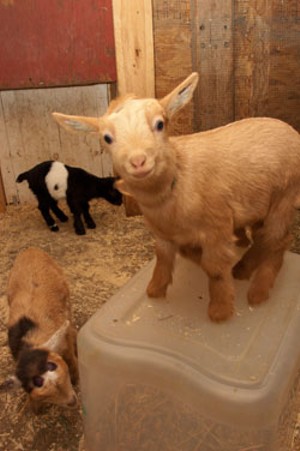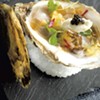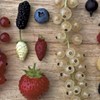Published March 23, 2011 at 10:32 a.m.
It’s kidding time at Willow Moon Farm, and a chorus of tiny bleats erupts as dozens of goat kids romp through the fresh straw in their pen. They pounce on their cousins and spring into the air as if launched by rubber bands. Others poke their tiny hooves through the wire mesh that lines their pen and peer curiously at visitors.
At a few weeks old, these kids are crazy-cute. Their fetching markings, such as black-and-white polka dots, make you want to bring one home. Besides, these Nigerian dwarf goats — with names such as Rubric, Tetris and Whirly Gig — will never grow taller than your waist.
Their home, for now, is the 27-acre Willow Moon Farm, a string of brick-red barns and buildings alongside the Winooski River in Plainfield. The farm also has chickens, an apiary and a fat, nosy cat named Pita. But here, the Nigerian dwarf goats rule.
“Pound for pound, they give more milk than a cow, and they eat a lot less,” says their owner, Sharon Peck, as she lingers by the kid pen. They’re also gentler and friendlier than the average goat. “We talk about ‘goat Zen,’ because they’re very calming to be around and very entertaining,” Peck adds. As well as productive: Peck’s daughter, Kim Ingraham, coaxes the does’ milk into lush cheeses redolent of the wildflowers and bucolic hills on which they graze.
Peck and Ingraham have been raising Nigerians for seven years now, since Peck purchased five does from a breeder in Maine in 2003. Though she grew up in Londonderry, Vt., Peck’s decades-long corporate career took her throughout the world, including to China, Africa and eastern Europe. On those travels, she couldn’t help but notice how ubiquitous goats were. “Every other place I went, I saw them,” she says — everywhere except for the U.S.
When she retired, Peck was ready to return to her roots, as well as to care for her aging parents. She first purchased some land in East Montpelier, and eventually the farm on which she lives now. Ingraham came to live and work with her from the get-go. As Peck researched dairy goats, the apparent superiority of Nigerian dwarves became clear.
As their name suggests, Nigerian dwarf goats are a West African breed, said to have arrived on this continent as snacks for the big cats that were being transported to American zoos in the 19th century. The survivors reproduced in those zoos so successfully that zookeepers eventually began selling them to farmers and homesteaders. Over time, the owners of what were then known as pygmy goats observed two strains in their livestock: one stockier and shorter legged, the other more elegant and Alpine looking. The latter came to be called Nigerian dwarf goats, and the first one (from Utah) was officially entered into the International Dairy Goat Registry on July 24, 1981.
For Peck, the animals’ smaller size — they top out around 75 pounds — was appealing, particularly because she can easily lift one herself. But the goats’ stature isn’t an impediment to their production. The goats need less space and feed than cows or larger goats, but they are excellent milk producers that average between 600 and 700 pounds per doe annually. Their milk is higher in butterfat than that of cows— from 6 to 10 percent, compared with 3 to 5 percent.
So Peck purchased “the very best does [she] could find” and set about creating a herd. Her first efforts at milking were awkward: Her fingers were used to tapping computers, not milking teats. “I had more milk on me than in the pail,” she recalls. By the end of three weeks, though, she had gained enough dexterity to settle into a smooth rhythm.
The 80-strong Willow Moon goat herd is pastured in late spring, summer and fall; over the winter, the goats are fed organic hay as well as oats, sunflower seeds and minerals. Through very selective breeding, Peck gradually increased their milk output: Willow Moon’s does produce an average of 800 pounds of milk each per year, and Peck’s goal is to eventually reach 1000 pounds. Last year, three of the top 10 Nigerian dwarf goat producers in the country were from Willow Moon’s herd: Bonita, Echo and Paulita.
Eventually, the mother-daughter team began selling raw milk from their farm; first, though, the cheses Ingraham made were given to friends and family. They took a deliberately long road toward commercial production; first, the women wanted to master the art of keeping their herd, which includes fastidious hygiene. “Those that start with both [a herd and cheese making] must be crazy or brilliant, or both,” says Peck.
By 2010, the two were ready to take a leap into retail, and so they expanded their milking capacity, from two goats at a time to six, and installed cheese-making and aging rooms. Willow Moon began rolling out fresh chevré, feta and raw-milk tomme, an Alpine-style cheese, last summer.
After a few months’ lull, kidding means the milk is flowing again on the farm. “I’m the milkmaid, [Kim] is the cheese maker,” says Peck, who milks 50 does twice daily. Once a goat gives birth, she lactates for an average of 305 days, during which Ingraham makes milk three times a week: chèvre on Monday, feta and tomme on Wednesday and Friday, most of it sold through the farm’s store.
Ingraham, clad in a white cap and gloves, works behind glass in the cheese-making room, scooping curds from chèvre, sprinkling rosemary over cubes of fresh, snow-white feta cheese that she bathes in olive oil, and washing the rind of her tomme every other day with brine.
As the goats’ feed changes, so does the flavor of the cheese, which tends to be higher in fat in the beginning and end of the lactation period. “We can make exactly the same cheese in July as we did in April, but because they’re not pastured yet in April, it can taste much different,” notes Peck.
She brings out a plate of cubed cheese for a guest to sample. The early-season Winooski Tomme — aged for five months — is firm and faintly salty, with mild flavors of almonds and citrus. Peck points out that it’s perfect for grating, but it’s exactly the kind of cheese some like to eat straight, akin to a slightly softer Asiago or Piave.
Later-season Winooski Tomme, aged for about 90 days, is creamier and nuttier and tastes of mushrooms and wet earth. The Willoughby Tomme, the farm’s newest cheese, lies somewhere between the two: more buttery than its early-season cousin, but more subtle than the Winooski Tomme.
By contrast, Willow Moon’s feta is feathery, briny and so soft it melts in your mouth; in its spiced olive-oil marinade, it’s an addictive, albeit fatty, snack.
The Willow Moon farm store opens on April 1, which is when Ingraham will again offer fresh chèvre, some of which she infuses with fresh basil, dill, chives or honey from the farm’s bees.
This year, Peck and Ingraham are plotting a few new cheeses, including a blue and maybe a semiripened cheese with an ash rind. Like many cheese makers, they’re anxiously awaiting the U.S. Food and Drug Administration’s impending decision on raw-milk cheeses. If these were banned outright, “It would be very sad, because aged raw-milk cheeses are more flavorful,” says Peck while noshing on some tomme.
The women have also been making goat-milk soap, an idea that gained steam when they figured out why Ingraham’s hands were always so soft. “We realized it was from the lactic acid in the cheese,” says Peck.
Back outside in the hoop house on a brisk March day, the does responsible for this smorgasbord lounge on their bed of hay, seeming to strike poses. Mitzi Godiva, who is soon to give birth, sits on her haunches to let her belly spread out before her. She gazes impassively at a trio of admirers. “She looks like a giant pear,” remarks Ingraham. An enormous white great Pyrenees dog named Alex lives with the herd, keeping watch against wild turkeys, fisher cats and coyotes.
Ninety percent of these does’ buoyant offspring will be sold; Willow Moon only keeps the most superior of their stock. The castrated males are called wethers, and they make wonderful pets, says Peck — they like to hike, play and eat weeds around the yard. She sells most of them to families, though she cautions that the animals should be kept outside. “Their nature is to jump, so if you have them in your house, they’ll be on your dining-room table, on your couch, on your kitchen counter.”
Info
Willow Moon Farm, 1495 Coburn Road, Plainfield, 454-9916.
More By This Author
About the Artist

Matthew Thorsen
Bio:
Matthew Thorsen was a photographer for Seven Days 1995-2018. Read all about his life and work here.
Matthew Thorsen was a photographer for Seven Days 1995-2018. Read all about his life and work here.
Speaking of Food,
-

Q&A: Howard Fisher Delivers Meals on Wheels With a Side of Good Cheer
Dec 20, 2023 -

Video: Howard Fisher Delivers Meals on Wheels
Dec 14, 2023 -

Q&A: Alexis Dexter Rescued 57 Shelter Cats During the July Flood
Sep 13, 2023 -

Video: Two Months After the Flood, Alexis Dexter Rebuilds Kitty Korner Café in Barre and Continues to Rescue Cats
Sep 7, 2023 -

Video: Saying Goodbye to Burlington’s Penny Cluse Café
Nov 17, 2022 - More »
Comments
Comments are closed.
From 2014-2020, Seven Days allowed readers to comment on all stories posted on our website. While we've appreciated the suggestions and insights, right now Seven Days is prioritizing our core mission — producing high-quality, responsible local journalism — over moderating online debates between readers.
To criticize, correct or praise our reporting, please send us a letter to the editor or send us a tip. We’ll check it out and report the results.
Online comments may return when we have better tech tools for managing them. Thanks for reading.















































